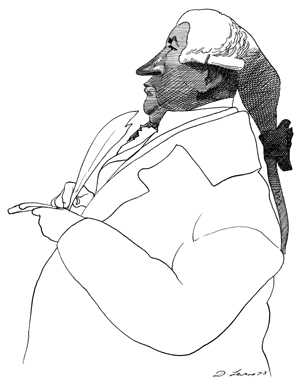Everyone with a serious interest in Samuel Johnson sooner or later reads not only Boswell’s Life but also the Anecdotes written by Hester Salusbury under her third surname, Piozzi. Hester was, of course, Johnson’s friend Mrs. Thrale, whose house at Streatham became a second home to Johnson between 1765 and 1780. The two books advertise a mutual enmity. In her book, Mrs. Piozzi snipes a few times at Boswell, and in a hastily written postscript indignantly denies the truth of a remark he has made, enpassant, that she “could not get through” Mrs. Montague’s book on Shakespeare.
Boswell, when his masterpiece finally appears five years later, takes the trouble to drive a steam roller over Mrs. Piozzi, mentioning her several times with disapprobation and finally, a few pages from the end, launching a sustained attack intended to destroy her little book entirely, bringing up example after example of inaccuracy and misrepresentation, and cautioning readers not to accept her version of Johnson’s character in exactly the manner of a lawyer addressing the jury (“As a sincere friend of the great man whose Life I am writing, I think it necessary to guard my readers against the mistaken notion of Dr. Johnson’s character, which this lady’s ‘Anecdotes’ of him suggest”). Boswell was not a barrister for nothing.
Mrs. Piozzi was powerless against these attacks. After marrying Piozzi in 1784, she went to the Continent on a wedding trip that lasted two years and seven months, which meant that she was hopelessly handicapped in the race for Johnsonian materials, anecdotes, letters. She had to rely on memory, and inevitably she made slips, and also drew a veil over situations in which she appeared in an unflattering light. Boswell, being a more skilled and scrupulous researcher than Mrs. Piozzi to begin with, and having far greater access to material, could, if he chose, bury her.
In fact, the good sense of readers has not allowed her Anecdotes to be buried. Skimpy as they are, and darkened toward the end by a feminine (and rather touching) plaintiveness, they exhibit a side of Johnson that on the whole swam through Boswell’s net. Johnson, a fearsome manic-depressive, showed mainly his manic side to Boswell, concealing from the younger man his weaknesses and fears, and preferring to act the role of the robust father figure and intellectual gladiator. He even laid claim to superior physical endurance, poking affectionate fun at Boswell in his Journey to the Western Islands because of the latter’s effort to mitigate the rigors of a night spent in a primitive inn.
To Mrs. Thrale he kept up no such bella figura. He allowed her—at times, indeed, compelled her—to gaze into the abyss of his fears and miseries. Obviously Boswell understood this, and his animus against Mrs. Piozzi arose at least partly from jealousy. Whatever were the shortcomings of her performance, it came out of an intimacy with Johnson greater than his own. Johnson heartily loved Boswell, but he never needed him as he needed Hester Thrale. Boswell’s place in Johnson’s life was not very different from that of any of the young men of good family for whom Johnson felt an attraction that was mutual. He was admitted to Johnson’s thoughts, but no more than the pious and benevolent Bennet Langton; he cheered and amused Johnson, but no more than the witty and malicious Topham Beauclerk.
In view of all this, it was inevitable that Boswell and Mrs. Thrale should end as enemies. But they were not, as one might have expected, enemies from the start. They began as good friends. Each had a genuine fund of generosity and good will; they were united in love and admiration for Johnson; moreover, backed by the great wealth of her husband, Hester Thrale was a good hostess and Boswell was (on the whole) a good guest. He introduced himself to her, in his inimitably cocky manner, by jumping into her coach one day in 1768 when she came to Johnson’s house to take him to Streatham; they got on well; and before long he was writing to her in a warm and confiding tone.
I told you Madam, that you and I were rivals for that great man. You would take him to the country, when I was anxious to keep him in town. But as I believe you to be a generous rival, I beg you may do me the favour to put Mr. Johnson in mind to write to me.
Mrs. Hyde’s story, told skillfully and with a wealth of unobtrusive scholarship, is of the downward spiral that led from friendship to the savage, in-fighting enmity of 1787 onward. The exact details of their worsening relationship, precisely where each blow landed and what damage it caused, are probably not of supreme moment to anyone; Mrs. Hyde tells the story clearly and with considerable élan, but it is not very important to try to hold it all in one’s head; something like this pattern of events would have happened anyway.
Advertisement
The good relations between them were very much the product of their shared veneration for Johnson; when his presence was removed—or, to speak more precisely, when Mrs. Thrale removed herself from his presence by marrying Piozzi and going abroad—the underlying rifts soon appeared. At no time did either of them have much respect for the other. Boswell saw all women as bed-fodder and disliked female intelligence; Mrs. Thrale was not impressed by Boswell’s literary and social gifts, though she allowed herself to seem so, for the sake of peace with Johnson. Then came the sudden and total disruption caused by her marriage in 1784. Boswell shared the general view that Piozzi, the gentle and courteous Italian musician, was a scandalously unfit husband for the brewer’s widow; he also resented, on Johnson’s behalf, the withdrawal of Mrs. Thrale’s services as hostess-cum-nurse. On her part, she was nettled by this attitude and, blissfully in love with Piozzi, she tried hard to defend herself and to doctor the record in a few places to show that she had been right.
She did this in two ways. First, in the Anecdotes of 1796 she stressed Johnson’s faults, showing him as increasingly demanding and querulous, until finally
I…found it convenient, for every reason of health, peace, and pecuniary circumstances, to retire to Bath, where I knew Mr. Johnson would not follow me, and where I could for that reason command some little portion of time for my own use; a thing impossible while I remained at Streatham or at London, as my hours, carriage, and servants had long been at his command, who would not rise in the morning till twelve o’clock perhaps, and oblige me to make breakfast for him till the bell rung for dinner, though much displeased if the toilet was neglected, and though much of the time we passed together was spent in blaming or deriding, very justly, my neglect of oeconomy, and waste of that money which might make many families happy.
Her second line of defense was to tamper—slightly—with the collection of Johnson’s letters which she published in 1788. By eighteenth-century standards she was a reasonably scrupulous editor, giving the 340 letters from Johnson with only a few cuts, and reserving her polishing and rewriting for the twenty-seven letters of her own which appeared among them. She did, however, make one large though forgivable omission. On receiving the news of her intended marriage, Johnson had written to her the famous letter of July 2, 1784, with its blistering scorn and anguish (“Madam, if I interpret your letter right, you are ignominiously married, if it is yet undone, let us once talk together,” etc.). She had replied with a dignified self-defense (“The birth of my second husband is not meaner than that of my first, his sentiments are not meaner, his profession is not meaner”). Within the week Johnson had written his bravely resigned letter in which something of the old affection struggles through.
I wish God may grant you every blessing, that you may be happy in this life for its short continuance, and eternally happy in a better state, and whatever I can contribute to your happiness, I am very ready to repay for that kindness which soothed twenty years of a life radically wretched.
In her edition, his angry and bitter letter is omitted; so is her defense, though it is easily the best letter she ever wrote; the announcement of her intentions is followed immediately by his wishes for her happiness and blessing. This was very understandable. But she could expect no delicacy from Boswell, who knew she had had an angry letter from Johnson and would, no doubt, have given much to get his hands on it. As it was, he had to content himself by saying darkly in the Life, “If she would publish the whole of the correspondence that passed between Dr. Johnson and her on the subject, we should have a full view of his real sentiments.”
Looking back now, one can easily feel that Boswell had no need to bury Mrs. Thrale so completely, just as he had no need to go out of his way to tread on the pedestrian biography of Johnson by John Hawkins. His masterpiece has no need of such competitiveness. But the years in which he toiled at it were sick, bitter years. Everyone was getting in ahead of him; no fewer than six memoirs of Johnson were published in the six years between Johnson’s death and the appearance of Boswell’s Life; his vast accumulation of materials loomed over his desk like some unscalable Andean range. He had many worries, and plunged often into despair and dissipation. All this time Mrs. Thrale was happy, fulfilled, protected, and reaping both money and prestige from the light volumes she threw together so easily.
Advertisement
The story of Boswell’s agony has been told before. But Mrs. Hyde tells it freshly, with many sidelights from new material, and she sets it beside the parallel story of the Piozzi household. The result is a book that all Johnsonians will read with great enjoyment. May one express the hope that this excellent book from Harvard will spur the Yale scholars to press on with their edition of Johnson’s Works, which seems so unaccountably to have shuddered to a halt?
This Issue
July 19, 1973




